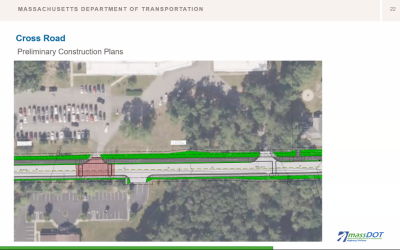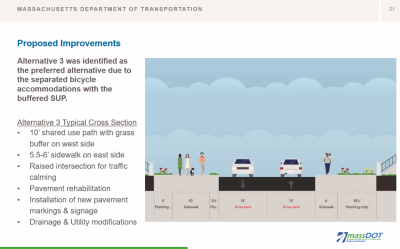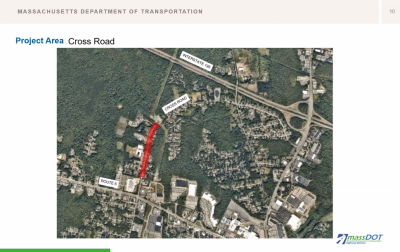Cross Road improvements hearing spurs logistical questions


As rain poured down Wednesday morning, Dec. 11, Dartmouth commuters who took Cross Road were given a gentle reminder of just how bad the flooding can get as they passed by Potter Elementary School.
A “Road Flooded” sign has made its permanent home on the median just before Pine Top Lane, where cars splash through deep puddles of water.
Proposed Cross Road improvements looking to address this drainage issue, as well as new sidepaths and an improved roadway edge, were met with logistical questions during a public hearing on Thursday, Dec. 5.
The proposed project, projected to begin in 2029, would cost an estimated $7 million with 80% of funds coming from federal aid and 20% from state funds, said Fil Yee, the project manager from the Massachusetts Department of Transportation. The project is programmed in the Statewide Transportation Improvement Program, which comprises federally-funded surface transportation projects.
Prior to the project’s start, some work will be done to alleviate existing flooding, said Greg Russell, the project manager at Vanasse Hangen Brustlin, a design consulting firm. This would include implementing temporary drainage.
Russell presented five options to improve sidewalks and crossings, which aren’t currently compliant with the Americans with Disabilities Act that states the minimum width of clear walking space is 3 feet with a maximum cross slope of 2%.
In addition to meeting the requirements of compliance, the project will make Cross Road more accommodating to pedestrians and cyclists, Russell said.
Of the five options, the project team landed on constructing a 10-foot wide shared use path on the west side of the street, which would be used by both pedestrians and cyclists. There would be a 5-foot 6-inch wide sidewalk on the east side.
Ten-foot wide sidepaths are the preferred width when a path is intended to be used by both pedestrians and cyclists, Russell said.
District 3 Fire Chief Richard Arruda raised concern over the sidepath’s end, specifically focusing on where cyclists would go as they would end up riding against traffic.
While the current plans include constructing a crosswalk at the end, the path would end at the bottom of a hill and after a bend in the road, which Arruda said was “probably the most dangerous part of Cross Road.”
Yee said the department would look into alternative locations to end the path.
During construction, there will likely be minor lane closures during workday non-peak hours and short-duration temporary road closures and detours but there isn’t anticipated to be night work and access to businesses and residences will be maintained, Russell said.
One way traffic patterns, where one side of the road is closed and the other is controlled by police officers to allow safe passage through the work zone, will likely be used, he added.
This raised some concern from James Kiely, assistant superintendent of finance and operations in the Dartmouth Public Schools, who said that around 450 people go in and out of Potter Elementary, located on Cross Road, during a school day.
“We would need to ensure that access Monday through Friday during the school year is maintained in regards to alternating one way traffic,” Kiely said at the hearing.
This includes making sure traffic flows in its normal direction when school buses pick up kids.
According to Yee, the department will take this into consideration.
The project would take around 30 months to complete, which factors in winter shutdowns and other disruptions, Russell said.
The town of Dartmouth will be responsible for acquiring the necessary rights in public land for the design, construction and implementation of the project, said Pamela Marquis, the liaison in the Massachusetts Department of Transportation’s Right of Way Bureau.
A right of way is a publicly owned area that’s reserved for transportation purposes. To construct the 10-foot wide sidepath, these areas would need to be used.
The estimated project cost of $7 million does not include acquisition costs for acquiring rights of way, Yee said.
Marquis said that affected property owners would be contacted by Dartmouth municipal officials.













